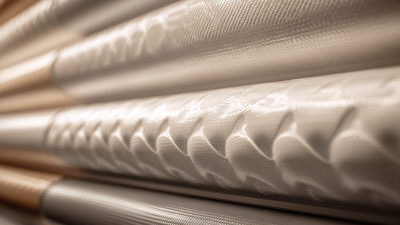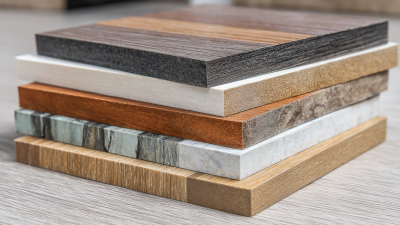Leave Your Message
-
Facebook
-
Whatsapp
-
Whatsapp


In today's rapidly evolving construction landscape, the quest for innovative and sustainable building materials is more pronounced than ever. Plastic Wall Panels have emerged as a game-changer, offering a multitude of benefits that cater to the demands of modern architecture. According to a report by Smithers Pira, the global market for plastic building materials is projected to reach $130 billion by 2024, illustrating a significant shift towards materials that enhance durability and aesthetic value while being environmentally friendly. These panels provide not only superior insulation and reduced maintenance costs but also contribute to the overall efficiency of building construction. As industry professionals and homeowners alike seek to balance aesthetics with function, understanding the advantages of Plastic Wall Panels becomes essential for unlocking new levels of innovation in construction.

Plastic wall panels are increasingly becoming a game-changer in modern construction, offering versatility that traditional materials often struggle to match. These innovative panels are not only lightweight and easy to install, but they also come in a variety of designs, colors, and textures. This flexibility allows architects and builders to create unique and aesthetically pleasing spaces that cater to diverse client needs. Whether for residential homes, commercial establishments, or industrial facilities, plastic wall panels can be tailored to fit any architectural vision.
Moreover, the practical benefits of plastic wall panels extend beyond mere aesthetics. Their resistance to moisture, mold, and mildew makes them an ideal choice for areas prone to humidity, such as bathrooms and kitchens. Additionally, these panels are energy efficient, providing excellent insulation that contributes to lower energy costs over time. With sustainability in mind, many plastic wall panels are manufactured from recycled materials, aligning with the growing demand for eco-friendly building solutions. This combination of functionality and style positions plastic wall panels as a versatile and forward-thinking option in the ever-evolving landscape of construction.

In recent years, plastic wall panels have emerged as a transformative element in modern construction, offering a myriad of benefits that are reshaping building practices. According to a report by MarketsandMarkets, the global plastic panels market is projected to reach USD 89.8 billion by 2026, growing at a compound annual growth rate (CAGR) of 5.1% from 2021. This substantial growth reflects the increasing preference for lightweight, durable materials in an industry eager for innovation.
One significant advantage of plastic wall panels is their versatility in design and application. They can be easily customized to suit various architectural styles, from commercial buildings to residential homes. Furthermore, plastic panels are exceptionally resistant to moisture, mold, and corrosion, enhancing their longevity and reducing maintenance costs. A study by the U.S. Department of Energy noted that using plastic composites can improve energy efficiency, as they offer better insulation properties compared to traditional materials. With such benefits, it's clear that plastic wall panels are not just a trend but a fundamental shift in how modern buildings are constructed, promoting sustainability and efficiency in the process.
In today's construction landscape, sustainability has become a guiding principle, and plastic wall panels are leading the charge toward eco-friendliness. Made from recycled materials, these panels significantly reduce waste and energy consumption during production compared to traditional building materials. Their lightweight nature not only minimizes the carbon footprint during transportation but also allows for quicker installation, further enhancing their eco-friendly profile.
Moreover, the durability of plastic wall panels means they require less maintenance and have a longer lifespan, reducing the need for frequent replacements that often contribute to landfill waste. Their resistance to moisture and mold also promotes healthier indoor environments, aligning with modern building practices that prioritize occupant well-being.
As innovations continue to unfold within the realm of construction, embracing sustainable solutions like plastic wall panels becomes essential for creating structures that are not only functional but also environmentally responsible.
In the modern construction landscape, cost-effectiveness is paramount, and plastic wall panels have emerged as a game-changer. These panels, known for their durability and longevity, can significantly reduce overall project expenses. According to a report by the National Association of Home Builders, materials that require less maintenance, like plastic panels, can save up to 30% in lifecycle costs compared to traditional materials. With their resistance to moisture and pests, plastic panels not only minimize repair costs but also extend the lifespan of structures.
Additionally, the labor costs associated with the installation of plastic wall panels are notably lower. Industry studies show that the lightweight nature of these panels allows for quicker handling and installation, reducing labor hours by as much as 20%. This efficiency translates directly to lower construction expenses. As builders increasingly seek sustainable and budget-friendly solutions, the adoption of plastic wall panels is not just a trend but a strategic move towards more cost-effective construction practices.

In modern architecture, design flexibility is paramount, and plastic wall panels offer an innovative solution that expands creative possibilities. With the ability to mimic natural materials and incorporate vibrant colors, these panels can transform any space while complying with contemporary aesthetic trends.
According to a report by the Freedonia Group, the plastic wall panel market is expected to grow by 7.5% annually, highlighting a shift towards more versatile and lightweight building materials in construction.
Furthermore, architects are increasingly leveraging the unique attributes of plastic wall panels, such as their ease of installation and low maintenance requirements. A study from the Building Research Establishment indicates that plastic panels not only reduce construction time but also lower overall project costs by 20% compared to traditional materials. This economic advantage, combined with the design versatility they offer—ranging from seamless installations to intricate patterns—positions plastic wall panels as a pivotal component in modern architectural design.






